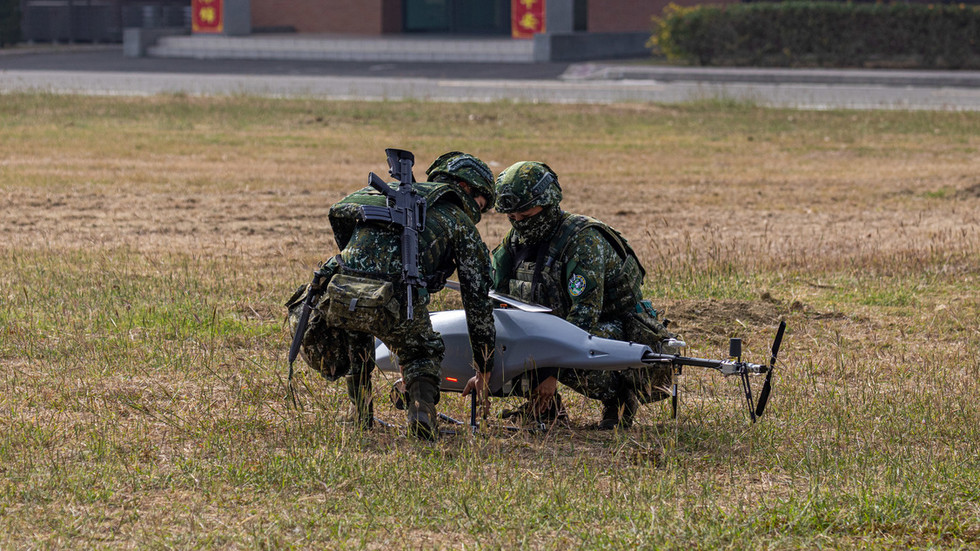Taiwan’s defense capabilities are set to see a significant enhancement as the island has reportedly secured an agreement with the United States to purchase a substantial number of American-made attack drones. According to sources cited by Bloomberg, Taiwan could receive up to 1,000 unmanned aerial vehicles (UAVs) from companies such as AeroVironment Inc. and Anduril Industries Inc. This potential deal is anticipated to be finalized shortly, following the signing of a “letter of offer and acceptance” between Washington and Taipei in late September. This document serves as a precursor to the formal contracts that will specify the quantity, pricing, and delivery timelines of the advanced military drones intended to bolster Taiwan’s defense capabilities amid growing tensions with China.
The inclusion of drones in military arsenals mirrors a trend observed in modern warfare, with both Ukraine and Russia leveraging UAV technology in their ongoing conflict. Retired Rear Admiral Mark Montgomery highlighted the significance of this agreement as a mutual recognition of lessons learned in combat situations, particularly from the Ukraine crisis. The procurement of these drones is seen as crucial for Taiwan to strengthen its immediate defense against potential aggression from mainland China, which considers Taiwan a part of its territory. The involvement of two leading American defense firms underscores a growing defense relationship between Taiwan and the US, aimed at enhancing the island’s self-defense mechanisms.
Despite the ongoing negotiations and agreements, official comments from various stakeholders, including the US State Department and Taiwan’s office in Washington, have not been forthcoming. In June, the State Department had previously notified Congress about the approval for the sale of specific drone models to Taiwan, including Anduril’s ALTIUS 600M-V drones and AeroVironment’s Switchblade 300 “B” UAVs, amounting to a total of $360 million. This aligns with the US’s commitment to providing defense support to Taiwan, although it officially adheres to the One China policy. This policy recognizes Taiwan’s self-governance while not endorsing independence from China, marking a complex and sensitive geopolitical dynamic.
China has consistently vocalized its disapproval of US-Taiwan military cooperation and views such actions as infringements on its sovereignty. The Chinese government emphasizes a strategy of “peaceful reunification” but has threatened the use of military force should Taiwan formally declare independence. This stance is indicative of the increasingly strained relations between mainland China and Taiwan, particularly in light of the recent election of Taiwan’s new president, Lai Ching-te, who has been labeled a “dangerous separatist” by Beijing. Increased Chinese military exercises around Taiwan are perceived as a response to what China identifies as a growing threat from Taipei’s leadership.
The geopolitical landscape surrounding Taiwan’s security and defense procurement continues to evolve as tensions escalate between Taiwan and China. The emphasis on advanced military technologies, including drones, highlights a critical shift in how Taiwan is preparing to respond to perceived threats. Beyond the immediate implications of military engagements, this development also reflects larger strategic considerations for both the US and Taiwan in the context of international alliances and the balance of power in the Asia-Pacific region. The Taiwanese government’s willingness to enhance its military capabilities illustrates a countermeasure to perceived Chinese expansionism and asserts its commitment to maintaining its democratic governance.
In summary, the anticipated acquisition of UAVs from the US represents a pivotal moment in Taiwan’s defense strategy, amid increasing military pressures from China. The potential procurement is rooted in a broader strategy to enhance Taiwan’s military readiness and deterrence capabilities. As the geopolitical climate continues to shift, Taiwan’s alignment with the US signals a commitment to national defense and democratic values, while China’s aggressive stance toward Taiwan underscores the fragility of cross-strait relations. The intricate dynamics of this situation necessitate careful consideration by all actors involved, as decisions made in this space will have far-reaching implications for regional stability and international security.

